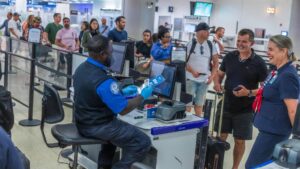
In the United States, the Federal Reserve in 2022 noted that the median White household has nearly eight times the wealth of the median Black household. While headlines often focus on police brutality, voter suppression, high Black unemployment, and housing discrimination, we must call out one of the most urgent root causes behind these issues; economic instability. Too many children are growing up in communities where poverty is passed down, financial literacy is not taught, and building wealth seems impossible. But the truth is, reversing this cycle requires all of us. Educators cannot do it alone. It takes a village. Parents, schools, churches, and local leaders must work together to create real pathways to ownership, opportunity, and financial freedom.
Black educators have always been central to that village. They shape pride, identity, and possibility. Today, their mission is at risk. Federal actions like the “Dear Colleague Letter” threaten race conscious teaching. Project 2025 pushes to reduce funding, privatize education, and strip Black history from classrooms. Many educators are already being asked to do more with fewer resources. They are facing burnout. Black teachers earn five to eight thousand dollars less than their White peers, yet they are expected to lead, mentor, and serve as examples in under-resourced schools. Without stronger support, we risk losing them at a critical time.
In March 2022, Florida passed the Dorothy L Hukill Financial Literacy Act. Starting with the class of 2027, students must complete a half credit in personal financial literacy to graduate. The course includes budgeting, debt, credit, taxes, and investing. This is an important step, but policy alone is not enough. These lessons must be reinforced through family conversations, community programs, and real world exposure. This is where the village must step in. What is taught in school must be supported at home, at dinner tables, in churches, and through programs like 100 Black Men Leadership Academy. We must talk about money, credit, and ownership. We must celebrate financial achievement alongside academic and athletic success. And most importantly, we must give educators the tools and support they need to lead.
The challenge before us is to Integrate financial education in all public schools, provide fair compensation and planning resources for educators, protect the right to teach Black history fully and truthfully, and encourage families and communities to reinforce financial education locally.
According to the TIAA Institute P Fin Index, African Americans score the lowest in financial literacy, answering just 38 percent of questions correctly. That number is more than a data point. It is a signal that we must act. The fight for equity does not begin in a bank. It begins in the classroom, but it is won when families, educators, and communities commit to building financial literacy together. That is how we change the future as a village.
Stan LeConte, CFP®, CRPC®, is the founder of IAA Private Wealth Advisors, an independent fiduciary wealth management firm based in Aventura, FL. He holds both 2-15 and 2-20 licenses, owns a separate property & casualty insurance agency, and specializes in tax planning, estate planning, and investment strategy for high-net-worth individuals, professionals, and business owners.






